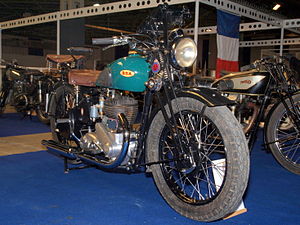BSA M20
 |
|
| Manufacturer | Birmingham Small Arms Company |
|---|---|
| Production | 1937–1955 |
| Engine | 496cc single cylinder side valve 4 stroke |
| Power | 13bhp @4,200 rpm |
| Transmission | 4 Speed / chain |
| Fuel capacity | 3 gallons |
The BSA M20 was a British motorcycle made by Birmingham Small Arms Company (BSA) at their factory in Small Heath, Birmingham. Although initially viewed as a near failure by the War Office in 1936, the M20 evolved into one of the longest serving motorcycles in the history of British military motorcycling, as well as becoming the most numerous type produced for World War II with 126,000 in active service. Many are still in use around the world today.
At the outbreak of World War II BSA were Britain's largest motorcycle manufacturer with a long history of armaments supply to the armed forces. Designed by Val Page the BSA M20 started development in 1937 as a heavy-framed sidecar model with a simple 500 cc single cylinder side valve engine. It had low compression and plenty of low-end torque through a standard BSA gearbox.
Early K-M20 models from 1939 were made from standard civilian parts with the addition of military fittings, such as a large 8-inch Lucas DUl42 headlight (fitted with a black out mask), a timing-gear cover with a screw-in plug for access to the magneto drive-pinion nut and special filler caps for the petrol and oil tanks. These early military M20 models were also fitted with a long spiked prop stand on the rear nearside pivoted from a lug brazed on to the rear frame tube. Factory ledgers show that BSA exported K-M20 models to Sweden, South Africa and India, as well as civilian dealers and distributors.
BSA workers employed making the M20 were killed in an air raid on the BSA factory in Armoury Road, Small Heath, Birmingham on the night of Tuesday 19 November 1940. The factory was one of the main targets for the Luftwaffe and at 9.25pm a low flying aircraft dropped two bombs which destroyed the southern end of the BSA building in Armoury Road. Rescuers included BSA's own fire brigade who pumped the Birmingham and Warwick canal dry putting out the fire. As well as 53 workers killed, 89 were injured and it was six weeks before the last of the bodies could be recovered. Much of the factory and equipment was destroyed or damaged but BSA had 67 factories so work was transferred elsewhere and production of the BSA M20 continued.
...
Wikipedia
